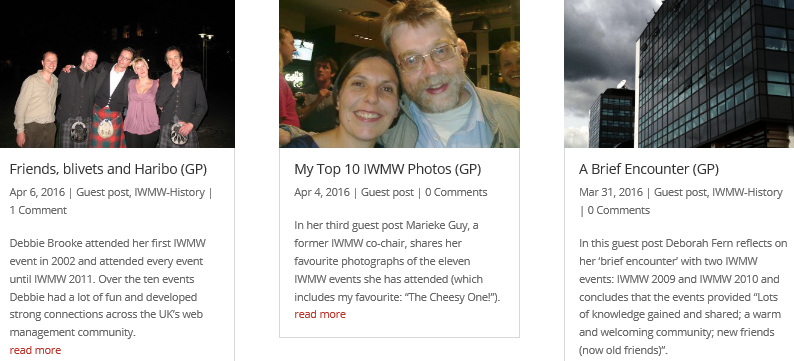About This Post
The IWMW event was launched in 1997. Content from the previous 19 events is still available, including event timetables, titles and abstracts for talks, speaker biographies and, in recent years, photographs taken at events. But to transform the digital resources into something more tangible there is a need for stories which may be triggered by the resources or by the memories of the events and the impact that events may have had on institutional practices. The IWMW blog has been set up to provide a channel for documenting such memories, before they fade. A dozen guest posts have been published so far. The invitation to contribute is being extended to everyone who has attended an IWMW event or may have been influenced by the event.
Note this is a slightly modified version of a post was first published on the UK Web Focus blog.
20 Years of IWMW!
This years annual Institutional Web Management Workshop, IWMW 2016, will be the 20th in the series. The event was launched in July 1997 with a two-day event. Although initially envisaged as a one-off event the feedback for the first event made it clear that there was interest in continuation of an event for those with responsibilities for management institutional web services. The event grew to be hosted over 3 days (with one exception, in 2010, when concerns over cutbacks in the sector led to the event being held over two days for that year only). The event peaked in popularity in 2009 when it attracted 197 participants. The Jisc cessation of funding for UKOLN in 2013 led to concerns that IWMW 2013 would be the final event. However participants at the event – and across the wider web management community – made it clear that there was continued interest in the event. The event was relaunched in 2014 (organised in conjunction with Netskills and hosted at Northumbria University) and in 2015 was held at Edge Hill University. As part of the transition from an event which was funded by the Jisc, an enlarged advisory group has been set up to oversee the planning for the IWMW 2016 event.
19 Years of IWMW Online Content!
The IWMW event is probably unique in long-standing IT-related events in the UK’s higher education community in the continued availability of the event web site content, which includes timetables, titles and abstracts for talks, speaker biographies and, for much of the content, access to speakers’ slides. This content is available on the original UKOLN web site (from 1997-2013) and the IWMW.org web site since then. In addition, in case of loss of the original content as well as providing a more conference set of resources, much of the content is also available on Lanyrd (NOTE no longer available).
Your Memories
Over the past 19 years there have been over 2,500 registrations at the events (although of course, many delegates will have attended multiple events). Judging from the comments received on the evaluation forms over the years the event has been highly regarded, not only for providing an opportunity to update one’s professional skills but also to develop one’s professional network – and also to have some fun!
The IWMW blog was launched recently in order to document memories of the event. In recent posts my former colleague Marieke Guy alludes to the IWMW song in her post on “IWMW: On the Web, the World Wide Web” which summaries her long-standing participation at the event as a delegate, speaker, facilitator and event co-chair. Marieke has also shared her thoughts on other aspects of the event in her posts on My Top 10 IWMW Session Titles and My Top 10 IWMW Photos.
In another post by a long-standing participant at IWMW event – “Friends, blivets and Haribo” – Debbie Brooke reflected on the ten events she has attended, as a delegate, workshop facilitator and local event organises and conclude “For me the friends I have made is definitely the best part of being involved with something as wonderful as IWMW for so many years“.
Many of the local event organisers have been invited to reflect on the events they helped organised with the first being “Ricky Rankin on IWMW 2001“. However a number of the local organisers have now left the sector or (like Ricky Rankin) have retired. This is to be expected for such a long-running event, so it will be important to capture memories before these numbers increase.
Other participants at IWMW events left the higher education sector following the economic turmoil and cuts which have affected the sector since 2008. In “A Brief Encounter” Deborah Fern reflected on her first event in 2009: “My overwhelming memory was the relief in finding a like-minded bunch of people facing similar challenges to myself“. The following year was turbulent with talks of public sector cuts and a general feeling of gloomy times to come in the HE sector which was reflected in many of the talks at the IWMW 2010 event. A passionate ‘call to arms’ by Ranjit Sidhu helped lift Deborah’s gloom and fill her ‘to do list’ for the months to come: “So as an optimist (with realistic tendencies) I came back from Sheffield fired up to lead my team through the challenges to come as evidenced in my blog post at the time“. Sadly shortly after publishing her post Deborah was to become a victim of those cuts (and yet another departmental restructure) – her job disappeared as the University removed a level of management to cut costs, Fortunately Deborah subsequently got a job as a Project Manager for a digital agency and is still “destroying chaos (organising project teams) and herding cats (organising clients) to this day“. In her post Deborah concluded “So what did the IWMW events mean to me? Lots of knowledge gained and shared; a warm and welcoming community; new friends (now old friends); fun nights and horrible hangovers – I loved every minute of it and long may it continue!”.
 The impact 0f IWMW events was also described in Kevin Mears‘ post which asked “What has IWMW done for me?“. Kevin (who is best know at IWMW events for his sketchnotes of the talks at the events) described how the “experience of his first [IWMW event] at the University of Essex was a wonderful realisation that here was a conference where I could speak to people experiencing similar problems with an understanding of university cultures“. Kevin concluded by paraphrasing the famous Monty Python quotation: “All right, but apart from the knowledge, information, education, wine, discussion, enthusiasm, contacts and community, what has the IWMW ever done for us?”
The impact 0f IWMW events was also described in Kevin Mears‘ post which asked “What has IWMW done for me?“. Kevin (who is best know at IWMW events for his sketchnotes of the talks at the events) described how the “experience of his first [IWMW event] at the University of Essex was a wonderful realisation that here was a conference where I could speak to people experiencing similar problems with an understanding of university cultures“. Kevin concluded by paraphrasing the famous Monty Python quotation: “All right, but apart from the knowledge, information, education, wine, discussion, enthusiasm, contacts and community, what has the IWMW ever done for us?”
Kevin is a member of the IWMW 2016 Advisory Group. Two other Advisory Group members have also contributed gust posts to the blog: Andrew Millar and Claire Gibbons
Andrew Millar launched the series of guest posts with his “Reflections on Recent IWMW Events” and concluded by describing his expectations of this year’s event from his perspective as a recently-appointed Head of Web Services at the University of Dundee: “What I hope for the conference, more than anything else, is that it continues to do what it does best. To bring together a community of people, to share openly and encourage but most of all to inspire us all to greatness in our own spheres of service.”
Claire Gibbons came to her first IWMW event in Bath in 2000, as ‘a slightly scared new Web Officer in her twenties’. In her guest post on “It Started in the Year 2000 – For Me” she looks back at her “love affair with IWMW“. Claire, who has attended 15 IWMW events, provided an answer to the question “why do I keep going back?”. IWMW events provide:
“an opportunity in a very hectic calendar to stop (Hammer Time) and spend time with very like-minded people, but also those who are willing to be a critical friend, challenge and stretch you, as well as encourage and support you and your ideas. Web (and, dare I say, digital) professionals aren’t rare, but they can struggle in HE institutions where their ideas and innovations may be ahead of where an institution is willing to go at that time – and IWMW is an opportunity to collectively come up with ideas to overcome these potential barriers“
In recent years it was noticeable that IWMW events was attracting significant numbers of first time attendees. One of these first-timers was Stratos Filalithis, the acting head for the University Website Programme at the University of Edinburgh. Stratos attended his first IWMW event in 2014 – and, as he described in his post on “Any 20th Year Anniversary is Significant!” discovered “a community to share and discuss ideas, meet people and look at things from a different perspective“.
Although many of the guest posts have focussed on the community aspects of the event, specific content areas have also been addressed. In particular in her guest post on “The Portal is Dead. Long Live the Portal!” Tracey Stanley, a librarian who has spoken at the IWMW 2002, 2003 and 2004 events, looks back at the panel session on “Avoiding Portal Wars” she participated in at the IWMW 2002 event. Tracey described how back in 2002 “We were all getting very excited about web portals in higher education back then, and many of us put these at the centre of our institutional web strategies“. Reflecting on the environment 14 years ago Tracy feel that:
“The Institutional Portal was perhaps seen at that time as a panacea by Senior Managers, Marketing and IT staff alike. Managers and Marketing wanted to separate out content for prospective students and external audiences and put it onto a flashy institutional website over which they could have complete control. Internal Communications were keen to find new ways of presenting internally-focused content – and the Institutional Portal offered the promise of delivering this in a way which segmented it according to the different internal audiences, so that users were only presented with the stuff that is most relevant to them. IT staff were keen to implement single-sign on so that the Institutional Portal could act as a one stop shop to all the web systems and services increasingly proliferating on campus – from the Library system to the Student Information System, and the VLE.“
But hands-up if you are using the hot institutional portal technologies of the time, such as IBM Websphere, uPortal (the open source portal offering), Luminis, and Sharepoint? Tracey feels that although there is still interest in institutional portals, she feels that in the UK the concept hasn’t gone much beyond the original early adopters, possibly because the model of aggregating everything into a single place on a web page perhaps makes less sense when increasingly users are accessing content through their smartphone or tablet.
Finally it should be mentioned that although the IWMW event is aimed primarily at members of the UK’s higher and further education sectors, there have been participants and speakers from a number of countries overseas. In the most recent guest post Mike Richwalsky provides his “Reflections on IWMW 2009 From the US” and concludes:
Without IWMW, I’d have never met so many amazing people, and I’d have never met Adam, who is now not only a business partner and colleague, but an amazing friend. For that, I will always be grateful for IWMW, and I have recommended it for not only my UK friends and colleagues, but for web and technology people in higher education in the USA looking to expand their knowledge and understand of global higher education.
An Opportunity To Contribute!
The IWMW blog provides an opportunity for those with responsibilities for managing institutional web services and other digital channels to contribute their thoughts. In addition the 20th anniversary provides an opportunity to reflect of the development of the community and the services provides over this significant period for the development of online services across the higher education sector.
A number of potential contributors have already been approached. However now that a dozen guest posts have been published it is timely to open up contributions more widely. As mentioned details of the content and speakers for all of the IWMW events is available on Lanyrd (NOTE no longer available due to cessation of Lanyrd service), which may help trigger memories. But for me such approaches to digital preservation (the preservation of the content itself) is insufficient – we also need the stories which can bring the content to life and provide the contextualisation to appreciate the relevance of the past to planning for the future.
So if you would like to contribute a guest post to the IWMW blog please get in touch (email to ukwebfocus@gmail.com).I’m looking forward to hearing from you.
Biography
 Brian Kelly established the IWMW event in 1997. Initially it was envisaged as a one-off event but the popularity of the event led to it being held annually ever since. IWMW 2016, which will be held at Liverpool John Moores University on 21-23 June, will be the 20th in the series. Brian, together with members of the IWMW 2016 Advisory Group, are looking forward to a memorable event!
Brian Kelly established the IWMW event in 1997. Initially it was envisaged as a one-off event but the popularity of the event led to it being held annually ever since. IWMW 2016, which will be held at Liverpool John Moores University on 21-23 June, will be the 20th in the series. Brian, together with members of the IWMW 2016 Advisory Group, are looking forward to a memorable event!
- Email: ukwebfocus@gmail.com
- Twitter: @briankelly
- Blog: ukwebfocus.com
- LinkedIn: Brian Kelly
Acknowledgements: Featured image from taken from posts published on the IWMW blog.


